Personal and Professional Skills in Management Report - Semester 1
VerifiedAdded on 2023/01/06
|8
|2240
|58
Report
AI Summary
This report is a reflective essay on the development and application of personal and professional skills in a management context. It explores the importance of effective communication, encompassing both verbal and non-verbal methods, and how assertive communication can positively impact workplace behavior. The report then delves into negotiation skills, differentiating between distributive and integrative approaches, and highlighting the importance of problem-solving, active listening, and building relationships. Finally, it examines personal influence, emphasizing the skills needed to drive change, build positive relationships, and foster trust to influence decisions. The essay utilizes Gibb's reflective cycle to analyze experiences and learning, offering practical insights into skill development for management professionals. The report concludes by underscoring the significance of these skills for achieving organizational objectives and fostering long-term relationships.
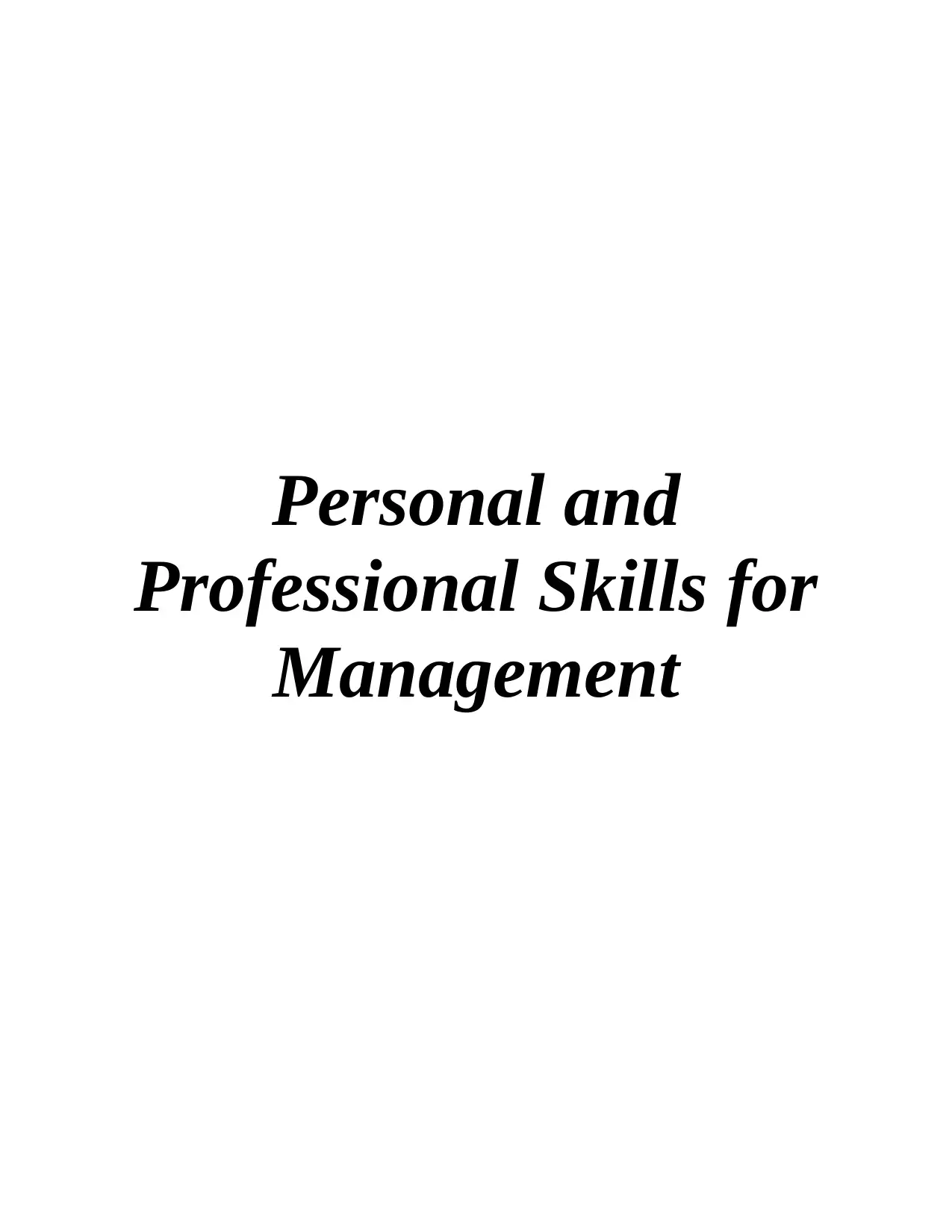
Personal and
Professional Skills for
Management
Professional Skills for
Management
Paraphrase This Document
Need a fresh take? Get an instant paraphrase of this document with our AI Paraphraser
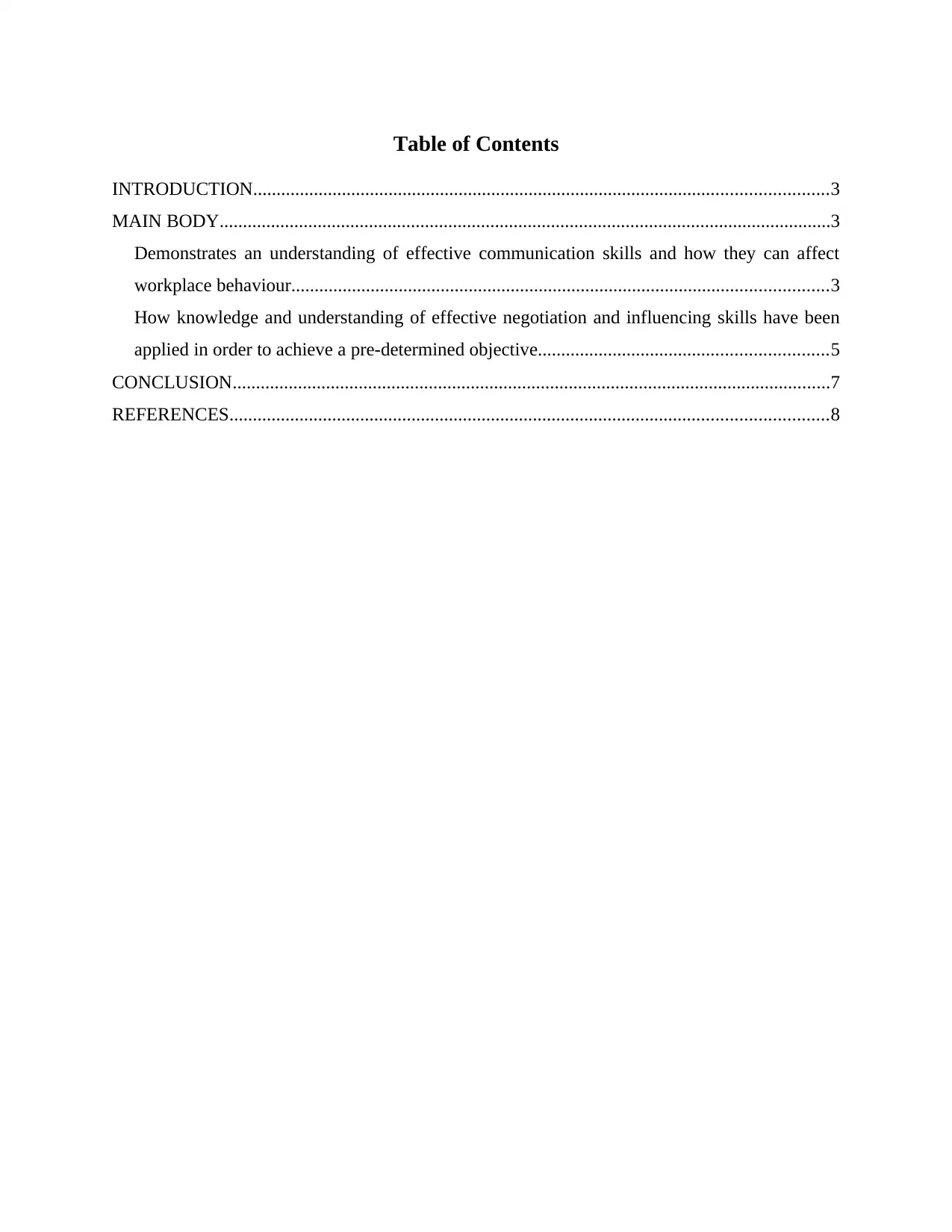
Table of Contents
INTRODUCTION...........................................................................................................................3
MAIN BODY...................................................................................................................................3
Demonstrates an understanding of effective communication skills and how they can affect
workplace behaviour...................................................................................................................3
How knowledge and understanding of effective negotiation and influencing skills have been
applied in order to achieve a pre-determined objective..............................................................5
CONCLUSION................................................................................................................................7
REFERENCES................................................................................................................................8
INTRODUCTION...........................................................................................................................3
MAIN BODY...................................................................................................................................3
Demonstrates an understanding of effective communication skills and how they can affect
workplace behaviour...................................................................................................................3
How knowledge and understanding of effective negotiation and influencing skills have been
applied in order to achieve a pre-determined objective..............................................................5
CONCLUSION................................................................................................................................7
REFERENCES................................................................................................................................8
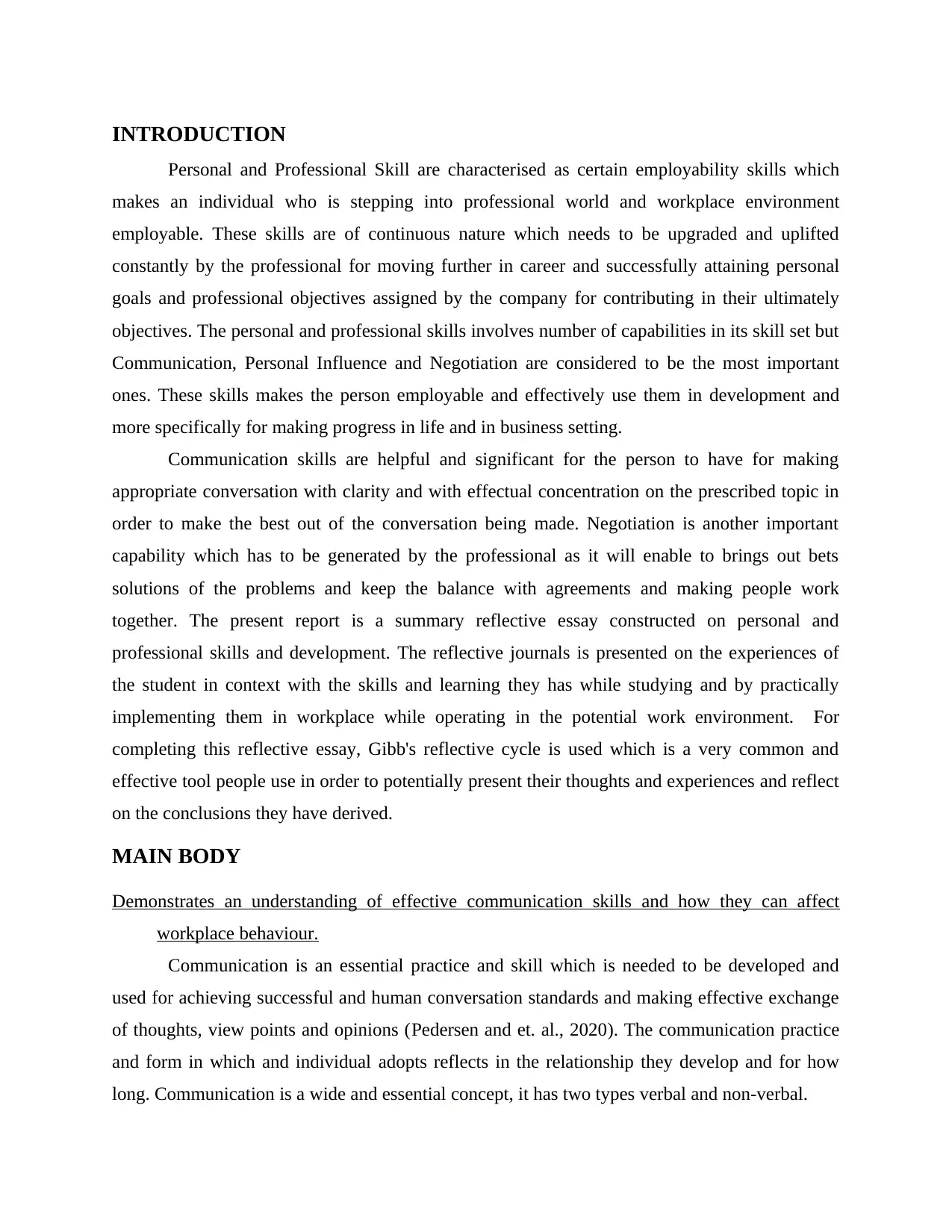
INTRODUCTION
Personal and Professional Skill are characterised as certain employability skills which
makes an individual who is stepping into professional world and workplace environment
employable. These skills are of continuous nature which needs to be upgraded and uplifted
constantly by the professional for moving further in career and successfully attaining personal
goals and professional objectives assigned by the company for contributing in their ultimately
objectives. The personal and professional skills involves number of capabilities in its skill set but
Communication, Personal Influence and Negotiation are considered to be the most important
ones. These skills makes the person employable and effectively use them in development and
more specifically for making progress in life and in business setting.
Communication skills are helpful and significant for the person to have for making
appropriate conversation with clarity and with effectual concentration on the prescribed topic in
order to make the best out of the conversation being made. Negotiation is another important
capability which has to be generated by the professional as it will enable to brings out bets
solutions of the problems and keep the balance with agreements and making people work
together. The present report is a summary reflective essay constructed on personal and
professional skills and development. The reflective journals is presented on the experiences of
the student in context with the skills and learning they has while studying and by practically
implementing them in workplace while operating in the potential work environment. For
completing this reflective essay, Gibb's reflective cycle is used which is a very common and
effective tool people use in order to potentially present their thoughts and experiences and reflect
on the conclusions they have derived.
MAIN BODY
Demonstrates an understanding of effective communication skills and how they can affect
workplace behaviour.
Communication is an essential practice and skill which is needed to be developed and
used for achieving successful and human conversation standards and making effective exchange
of thoughts, view points and opinions (Pedersen and et. al., 2020). The communication practice
and form in which and individual adopts reflects in the relationship they develop and for how
long. Communication is a wide and essential concept, it has two types verbal and non-verbal.
Personal and Professional Skill are characterised as certain employability skills which
makes an individual who is stepping into professional world and workplace environment
employable. These skills are of continuous nature which needs to be upgraded and uplifted
constantly by the professional for moving further in career and successfully attaining personal
goals and professional objectives assigned by the company for contributing in their ultimately
objectives. The personal and professional skills involves number of capabilities in its skill set but
Communication, Personal Influence and Negotiation are considered to be the most important
ones. These skills makes the person employable and effectively use them in development and
more specifically for making progress in life and in business setting.
Communication skills are helpful and significant for the person to have for making
appropriate conversation with clarity and with effectual concentration on the prescribed topic in
order to make the best out of the conversation being made. Negotiation is another important
capability which has to be generated by the professional as it will enable to brings out bets
solutions of the problems and keep the balance with agreements and making people work
together. The present report is a summary reflective essay constructed on personal and
professional skills and development. The reflective journals is presented on the experiences of
the student in context with the skills and learning they has while studying and by practically
implementing them in workplace while operating in the potential work environment. For
completing this reflective essay, Gibb's reflective cycle is used which is a very common and
effective tool people use in order to potentially present their thoughts and experiences and reflect
on the conclusions they have derived.
MAIN BODY
Demonstrates an understanding of effective communication skills and how they can affect
workplace behaviour.
Communication is an essential practice and skill which is needed to be developed and
used for achieving successful and human conversation standards and making effective exchange
of thoughts, view points and opinions (Pedersen and et. al., 2020). The communication practice
and form in which and individual adopts reflects in the relationship they develop and for how
long. Communication is a wide and essential concept, it has two types verbal and non-verbal.
⊘ This is a preview!⊘
Do you want full access?
Subscribe today to unlock all pages.

Trusted by 1+ million students worldwide
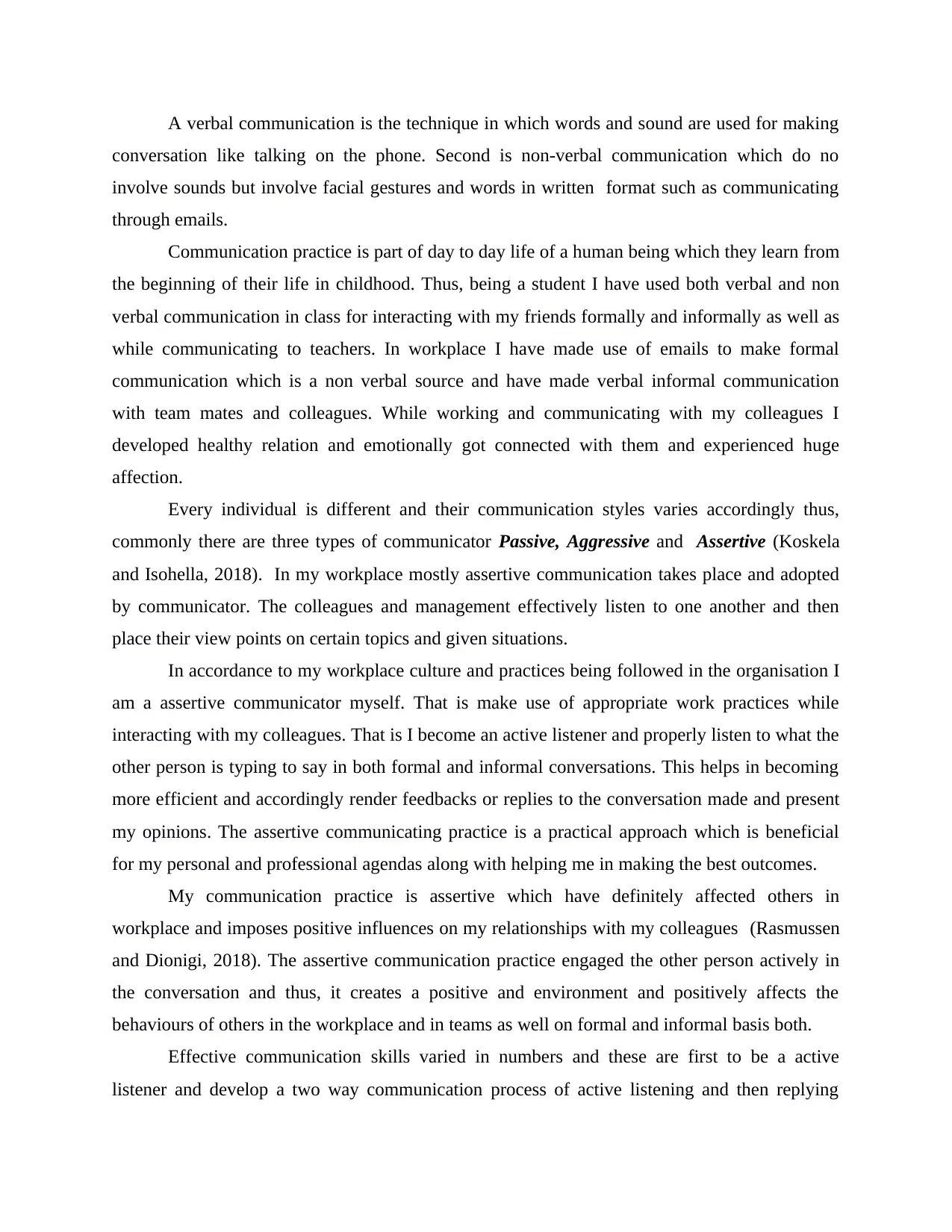
A verbal communication is the technique in which words and sound are used for making
conversation like talking on the phone. Second is non-verbal communication which do no
involve sounds but involve facial gestures and words in written format such as communicating
through emails.
Communication practice is part of day to day life of a human being which they learn from
the beginning of their life in childhood. Thus, being a student I have used both verbal and non
verbal communication in class for interacting with my friends formally and informally as well as
while communicating to teachers. In workplace I have made use of emails to make formal
communication which is a non verbal source and have made verbal informal communication
with team mates and colleagues. While working and communicating with my colleagues I
developed healthy relation and emotionally got connected with them and experienced huge
affection.
Every individual is different and their communication styles varies accordingly thus,
commonly there are three types of communicator Passive, Aggressive and Assertive (Koskela
and Isohella, 2018). In my workplace mostly assertive communication takes place and adopted
by communicator. The colleagues and management effectively listen to one another and then
place their view points on certain topics and given situations.
In accordance to my workplace culture and practices being followed in the organisation I
am a assertive communicator myself. That is make use of appropriate work practices while
interacting with my colleagues. That is I become an active listener and properly listen to what the
other person is typing to say in both formal and informal conversations. This helps in becoming
more efficient and accordingly render feedbacks or replies to the conversation made and present
my opinions. The assertive communicating practice is a practical approach which is beneficial
for my personal and professional agendas along with helping me in making the best outcomes.
My communication practice is assertive which have definitely affected others in
workplace and imposes positive influences on my relationships with my colleagues (Rasmussen
and Dionigi, 2018). The assertive communication practice engaged the other person actively in
the conversation and thus, it creates a positive and environment and positively affects the
behaviours of others in the workplace and in teams as well on formal and informal basis both.
Effective communication skills varied in numbers and these are first to be a active
listener and develop a two way communication process of active listening and then replying
conversation like talking on the phone. Second is non-verbal communication which do no
involve sounds but involve facial gestures and words in written format such as communicating
through emails.
Communication practice is part of day to day life of a human being which they learn from
the beginning of their life in childhood. Thus, being a student I have used both verbal and non
verbal communication in class for interacting with my friends formally and informally as well as
while communicating to teachers. In workplace I have made use of emails to make formal
communication which is a non verbal source and have made verbal informal communication
with team mates and colleagues. While working and communicating with my colleagues I
developed healthy relation and emotionally got connected with them and experienced huge
affection.
Every individual is different and their communication styles varies accordingly thus,
commonly there are three types of communicator Passive, Aggressive and Assertive (Koskela
and Isohella, 2018). In my workplace mostly assertive communication takes place and adopted
by communicator. The colleagues and management effectively listen to one another and then
place their view points on certain topics and given situations.
In accordance to my workplace culture and practices being followed in the organisation I
am a assertive communicator myself. That is make use of appropriate work practices while
interacting with my colleagues. That is I become an active listener and properly listen to what the
other person is typing to say in both formal and informal conversations. This helps in becoming
more efficient and accordingly render feedbacks or replies to the conversation made and present
my opinions. The assertive communicating practice is a practical approach which is beneficial
for my personal and professional agendas along with helping me in making the best outcomes.
My communication practice is assertive which have definitely affected others in
workplace and imposes positive influences on my relationships with my colleagues (Rasmussen
and Dionigi, 2018). The assertive communication practice engaged the other person actively in
the conversation and thus, it creates a positive and environment and positively affects the
behaviours of others in the workplace and in teams as well on formal and informal basis both.
Effective communication skills varied in numbers and these are first to be a active
listener and develop a two way communication process of active listening and then replying
Paraphrase This Document
Need a fresh take? Get an instant paraphrase of this document with our AI Paraphraser
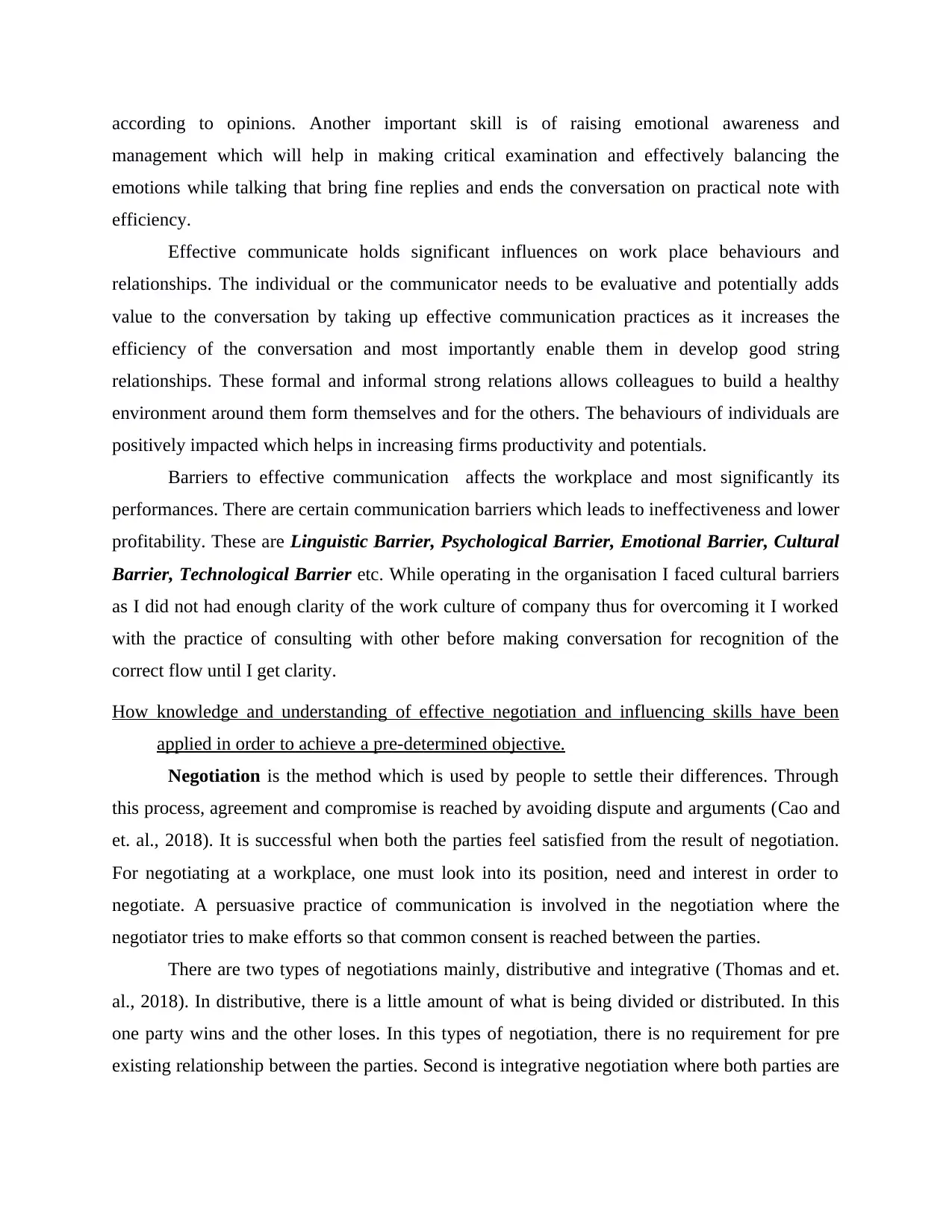
according to opinions. Another important skill is of raising emotional awareness and
management which will help in making critical examination and effectively balancing the
emotions while talking that bring fine replies and ends the conversation on practical note with
efficiency.
Effective communicate holds significant influences on work place behaviours and
relationships. The individual or the communicator needs to be evaluative and potentially adds
value to the conversation by taking up effective communication practices as it increases the
efficiency of the conversation and most importantly enable them in develop good string
relationships. These formal and informal strong relations allows colleagues to build a healthy
environment around them form themselves and for the others. The behaviours of individuals are
positively impacted which helps in increasing firms productivity and potentials.
Barriers to effective communication affects the workplace and most significantly its
performances. There are certain communication barriers which leads to ineffectiveness and lower
profitability. These are Linguistic Barrier, Psychological Barrier, Emotional Barrier, Cultural
Barrier, Technological Barrier etc. While operating in the organisation I faced cultural barriers
as I did not had enough clarity of the work culture of company thus for overcoming it I worked
with the practice of consulting with other before making conversation for recognition of the
correct flow until I get clarity.
How knowledge and understanding of effective negotiation and influencing skills have been
applied in order to achieve a pre-determined objective.
Negotiation is the method which is used by people to settle their differences. Through
this process, agreement and compromise is reached by avoiding dispute and arguments (Cao and
et. al., 2018). It is successful when both the parties feel satisfied from the result of negotiation.
For negotiating at a workplace, one must look into its position, need and interest in order to
negotiate. A persuasive practice of communication is involved in the negotiation where the
negotiator tries to make efforts so that common consent is reached between the parties.
There are two types of negotiations mainly, distributive and integrative (Thomas and et.
al., 2018). In distributive, there is a little amount of what is being divided or distributed. In this
one party wins and the other loses. In this types of negotiation, there is no requirement for pre
existing relationship between the parties. Second is integrative negotiation where both parties are
management which will help in making critical examination and effectively balancing the
emotions while talking that bring fine replies and ends the conversation on practical note with
efficiency.
Effective communicate holds significant influences on work place behaviours and
relationships. The individual or the communicator needs to be evaluative and potentially adds
value to the conversation by taking up effective communication practices as it increases the
efficiency of the conversation and most importantly enable them in develop good string
relationships. These formal and informal strong relations allows colleagues to build a healthy
environment around them form themselves and for the others. The behaviours of individuals are
positively impacted which helps in increasing firms productivity and potentials.
Barriers to effective communication affects the workplace and most significantly its
performances. There are certain communication barriers which leads to ineffectiveness and lower
profitability. These are Linguistic Barrier, Psychological Barrier, Emotional Barrier, Cultural
Barrier, Technological Barrier etc. While operating in the organisation I faced cultural barriers
as I did not had enough clarity of the work culture of company thus for overcoming it I worked
with the practice of consulting with other before making conversation for recognition of the
correct flow until I get clarity.
How knowledge and understanding of effective negotiation and influencing skills have been
applied in order to achieve a pre-determined objective.
Negotiation is the method which is used by people to settle their differences. Through
this process, agreement and compromise is reached by avoiding dispute and arguments (Cao and
et. al., 2018). It is successful when both the parties feel satisfied from the result of negotiation.
For negotiating at a workplace, one must look into its position, need and interest in order to
negotiate. A persuasive practice of communication is involved in the negotiation where the
negotiator tries to make efforts so that common consent is reached between the parties.
There are two types of negotiations mainly, distributive and integrative (Thomas and et.
al., 2018). In distributive, there is a little amount of what is being divided or distributed. In this
one party wins and the other loses. In this types of negotiation, there is no requirement for pre
existing relationship between the parties. Second is integrative negotiation where both parties are
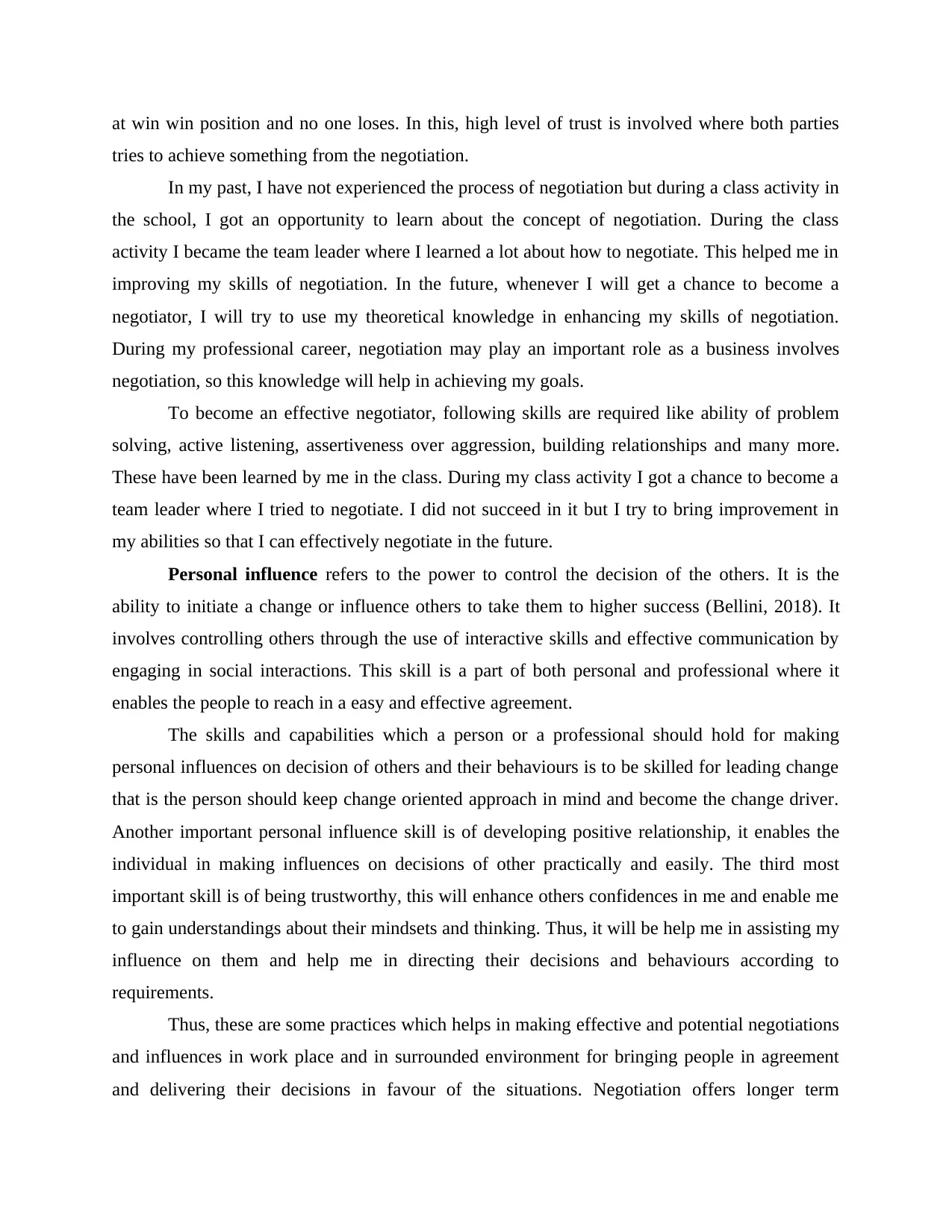
at win win position and no one loses. In this, high level of trust is involved where both parties
tries to achieve something from the negotiation.
In my past, I have not experienced the process of negotiation but during a class activity in
the school, I got an opportunity to learn about the concept of negotiation. During the class
activity I became the team leader where I learned a lot about how to negotiate. This helped me in
improving my skills of negotiation. In the future, whenever I will get a chance to become a
negotiator, I will try to use my theoretical knowledge in enhancing my skills of negotiation.
During my professional career, negotiation may play an important role as a business involves
negotiation, so this knowledge will help in achieving my goals.
To become an effective negotiator, following skills are required like ability of problem
solving, active listening, assertiveness over aggression, building relationships and many more.
These have been learned by me in the class. During my class activity I got a chance to become a
team leader where I tried to negotiate. I did not succeed in it but I try to bring improvement in
my abilities so that I can effectively negotiate in the future.
Personal influence refers to the power to control the decision of the others. It is the
ability to initiate a change or influence others to take them to higher success (Bellini, 2018). It
involves controlling others through the use of interactive skills and effective communication by
engaging in social interactions. This skill is a part of both personal and professional where it
enables the people to reach in a easy and effective agreement.
The skills and capabilities which a person or a professional should hold for making
personal influences on decision of others and their behaviours is to be skilled for leading change
that is the person should keep change oriented approach in mind and become the change driver.
Another important personal influence skill is of developing positive relationship, it enables the
individual in making influences on decisions of other practically and easily. The third most
important skill is of being trustworthy, this will enhance others confidences in me and enable me
to gain understandings about their mindsets and thinking. Thus, it will be help me in assisting my
influence on them and help me in directing their decisions and behaviours according to
requirements.
Thus, these are some practices which helps in making effective and potential negotiations
and influences in work place and in surrounded environment for bringing people in agreement
and delivering their decisions in favour of the situations. Negotiation offers longer term
tries to achieve something from the negotiation.
In my past, I have not experienced the process of negotiation but during a class activity in
the school, I got an opportunity to learn about the concept of negotiation. During the class
activity I became the team leader where I learned a lot about how to negotiate. This helped me in
improving my skills of negotiation. In the future, whenever I will get a chance to become a
negotiator, I will try to use my theoretical knowledge in enhancing my skills of negotiation.
During my professional career, negotiation may play an important role as a business involves
negotiation, so this knowledge will help in achieving my goals.
To become an effective negotiator, following skills are required like ability of problem
solving, active listening, assertiveness over aggression, building relationships and many more.
These have been learned by me in the class. During my class activity I got a chance to become a
team leader where I tried to negotiate. I did not succeed in it but I try to bring improvement in
my abilities so that I can effectively negotiate in the future.
Personal influence refers to the power to control the decision of the others. It is the
ability to initiate a change or influence others to take them to higher success (Bellini, 2018). It
involves controlling others through the use of interactive skills and effective communication by
engaging in social interactions. This skill is a part of both personal and professional where it
enables the people to reach in a easy and effective agreement.
The skills and capabilities which a person or a professional should hold for making
personal influences on decision of others and their behaviours is to be skilled for leading change
that is the person should keep change oriented approach in mind and become the change driver.
Another important personal influence skill is of developing positive relationship, it enables the
individual in making influences on decisions of other practically and easily. The third most
important skill is of being trustworthy, this will enhance others confidences in me and enable me
to gain understandings about their mindsets and thinking. Thus, it will be help me in assisting my
influence on them and help me in directing their decisions and behaviours according to
requirements.
Thus, these are some practices which helps in making effective and potential negotiations
and influences in work place and in surrounded environment for bringing people in agreement
and delivering their decisions in favour of the situations. Negotiation offers longer term
⊘ This is a preview!⊘
Do you want full access?
Subscribe today to unlock all pages.

Trusted by 1+ million students worldwide
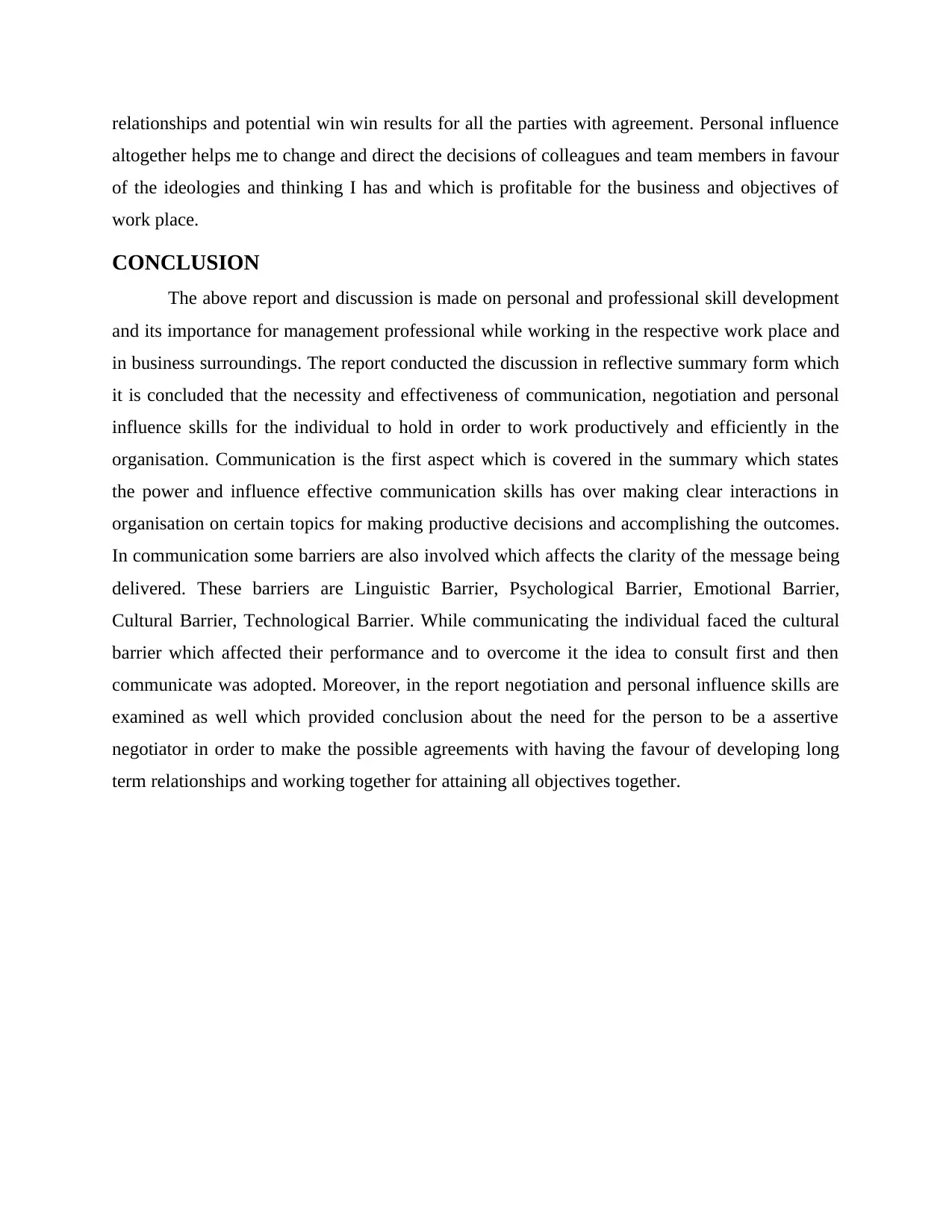
relationships and potential win win results for all the parties with agreement. Personal influence
altogether helps me to change and direct the decisions of colleagues and team members in favour
of the ideologies and thinking I has and which is profitable for the business and objectives of
work place.
CONCLUSION
The above report and discussion is made on personal and professional skill development
and its importance for management professional while working in the respective work place and
in business surroundings. The report conducted the discussion in reflective summary form which
it is concluded that the necessity and effectiveness of communication, negotiation and personal
influence skills for the individual to hold in order to work productively and efficiently in the
organisation. Communication is the first aspect which is covered in the summary which states
the power and influence effective communication skills has over making clear interactions in
organisation on certain topics for making productive decisions and accomplishing the outcomes.
In communication some barriers are also involved which affects the clarity of the message being
delivered. These barriers are Linguistic Barrier, Psychological Barrier, Emotional Barrier,
Cultural Barrier, Technological Barrier. While communicating the individual faced the cultural
barrier which affected their performance and to overcome it the idea to consult first and then
communicate was adopted. Moreover, in the report negotiation and personal influence skills are
examined as well which provided conclusion about the need for the person to be a assertive
negotiator in order to make the possible agreements with having the favour of developing long
term relationships and working together for attaining all objectives together.
altogether helps me to change and direct the decisions of colleagues and team members in favour
of the ideologies and thinking I has and which is profitable for the business and objectives of
work place.
CONCLUSION
The above report and discussion is made on personal and professional skill development
and its importance for management professional while working in the respective work place and
in business surroundings. The report conducted the discussion in reflective summary form which
it is concluded that the necessity and effectiveness of communication, negotiation and personal
influence skills for the individual to hold in order to work productively and efficiently in the
organisation. Communication is the first aspect which is covered in the summary which states
the power and influence effective communication skills has over making clear interactions in
organisation on certain topics for making productive decisions and accomplishing the outcomes.
In communication some barriers are also involved which affects the clarity of the message being
delivered. These barriers are Linguistic Barrier, Psychological Barrier, Emotional Barrier,
Cultural Barrier, Technological Barrier. While communicating the individual faced the cultural
barrier which affected their performance and to overcome it the idea to consult first and then
communicate was adopted. Moreover, in the report negotiation and personal influence skills are
examined as well which provided conclusion about the need for the person to be a assertive
negotiator in order to make the possible agreements with having the favour of developing long
term relationships and working together for attaining all objectives together.
Paraphrase This Document
Need a fresh take? Get an instant paraphrase of this document with our AI Paraphraser
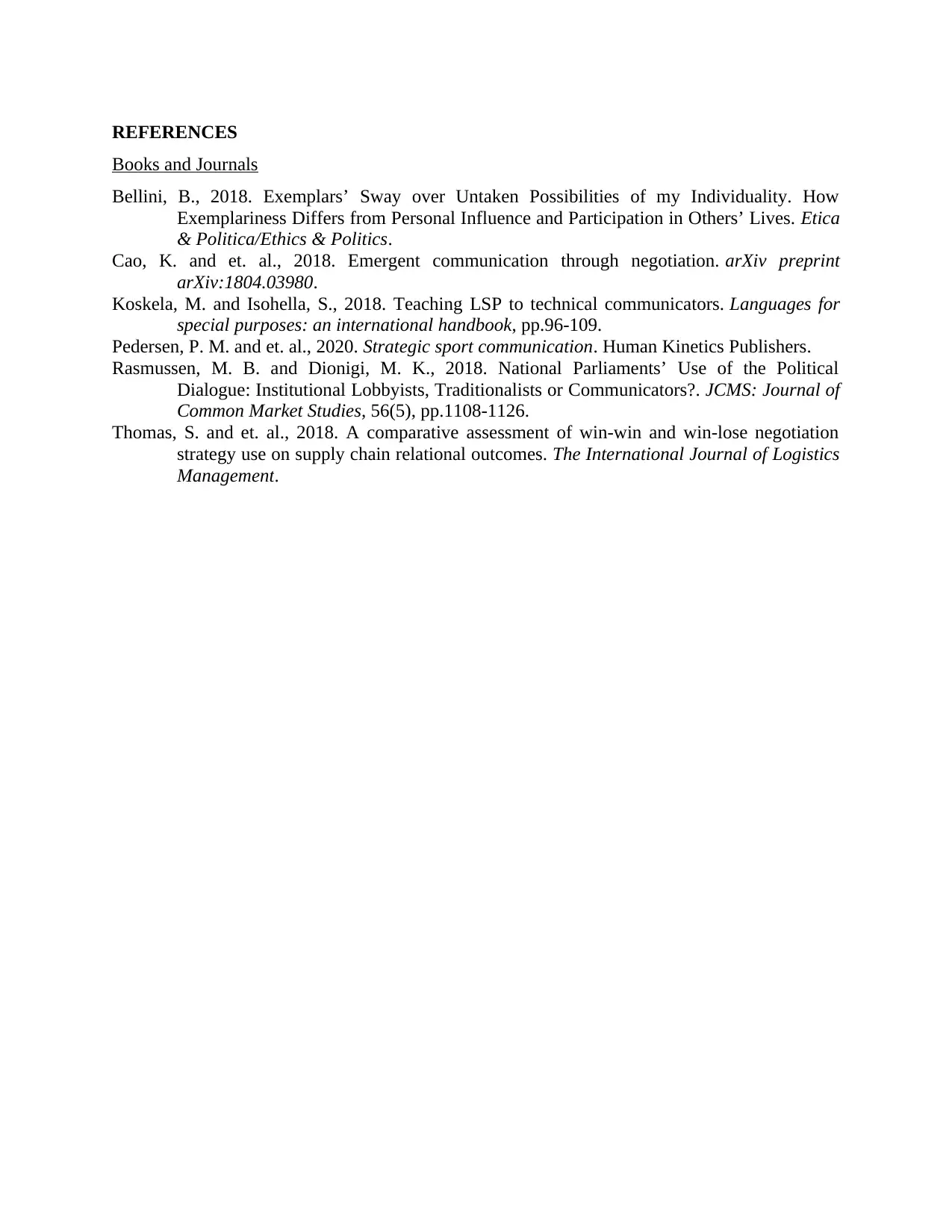
REFERENCES
Books and Journals
Bellini, B., 2018. Exemplars’ Sway over Untaken Possibilities of my Individuality. How
Exemplariness Differs from Personal Influence and Participation in Others’ Lives. Etica
& Politica/Ethics & Politics.
Cao, K. and et. al., 2018. Emergent communication through negotiation. arXiv preprint
arXiv:1804.03980.
Koskela, M. and Isohella, S., 2018. Teaching LSP to technical communicators. Languages for
special purposes: an international handbook, pp.96-109.
Pedersen, P. M. and et. al., 2020. Strategic sport communication. Human Kinetics Publishers.
Rasmussen, M. B. and Dionigi, M. K., 2018. National Parliaments’ Use of the Political
Dialogue: Institutional Lobbyists, Traditionalists or Communicators?. JCMS: Journal of
Common Market Studies, 56(5), pp.1108-1126.
Thomas, S. and et. al., 2018. A comparative assessment of win-win and win-lose negotiation
strategy use on supply chain relational outcomes. The International Journal of Logistics
Management.
Books and Journals
Bellini, B., 2018. Exemplars’ Sway over Untaken Possibilities of my Individuality. How
Exemplariness Differs from Personal Influence and Participation in Others’ Lives. Etica
& Politica/Ethics & Politics.
Cao, K. and et. al., 2018. Emergent communication through negotiation. arXiv preprint
arXiv:1804.03980.
Koskela, M. and Isohella, S., 2018. Teaching LSP to technical communicators. Languages for
special purposes: an international handbook, pp.96-109.
Pedersen, P. M. and et. al., 2020. Strategic sport communication. Human Kinetics Publishers.
Rasmussen, M. B. and Dionigi, M. K., 2018. National Parliaments’ Use of the Political
Dialogue: Institutional Lobbyists, Traditionalists or Communicators?. JCMS: Journal of
Common Market Studies, 56(5), pp.1108-1126.
Thomas, S. and et. al., 2018. A comparative assessment of win-win and win-lose negotiation
strategy use on supply chain relational outcomes. The International Journal of Logistics
Management.
1 out of 8
Related Documents
Your All-in-One AI-Powered Toolkit for Academic Success.
+13062052269
info@desklib.com
Available 24*7 on WhatsApp / Email
![[object Object]](/_next/static/media/star-bottom.7253800d.svg)
Unlock your academic potential
Copyright © 2020–2026 A2Z Services. All Rights Reserved. Developed and managed by ZUCOL.




